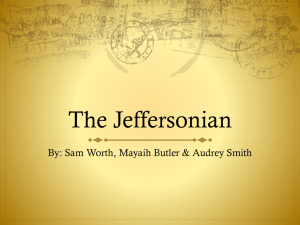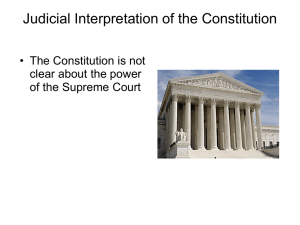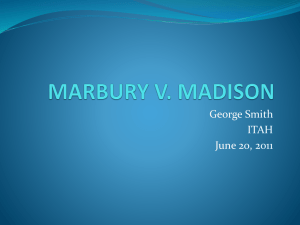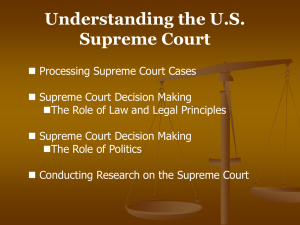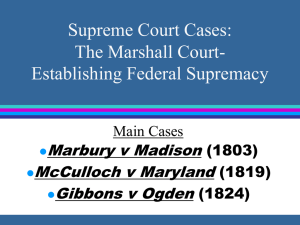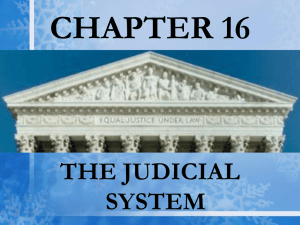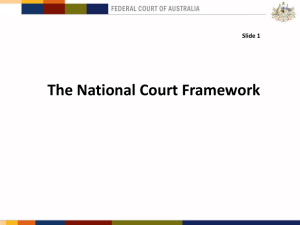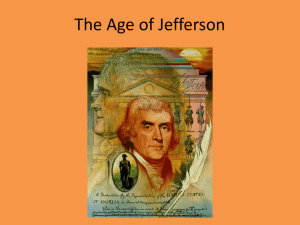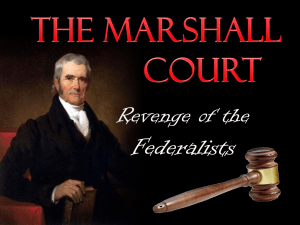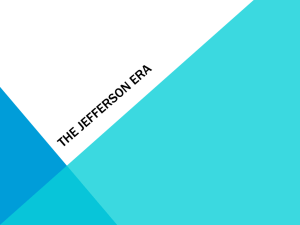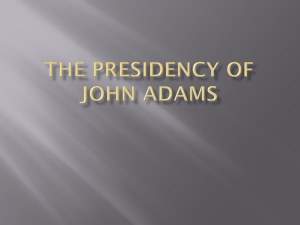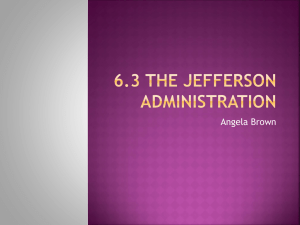Marbury.08 - Seanwilson.org
advertisement
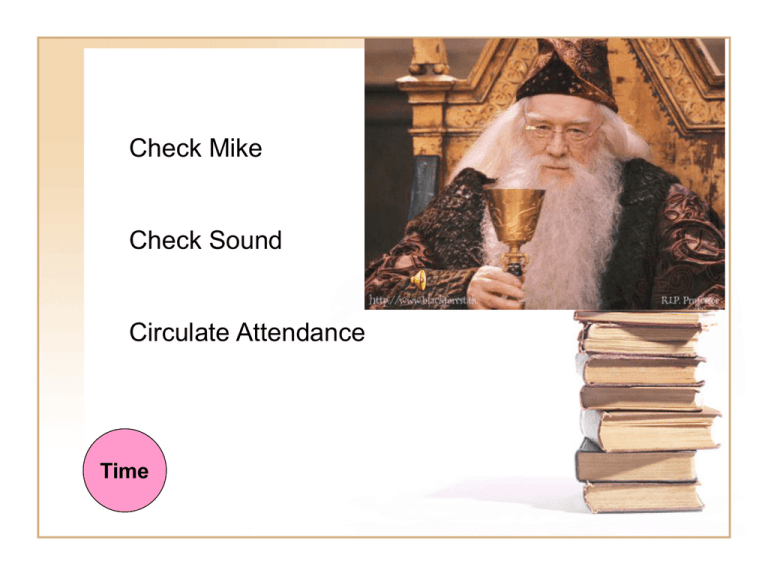
Check Mike Check Sound Circulate Attendance Time Today’s Lecture: The Greatest Case in the History of American Jurisprudence 1. Marbury v. Madison 2. Judicial Review Lecture Organization: • Class Announcements • Judiciary Act of 1789 • Midnight Judges • Marbury v. Madison • Judicial Review in the New Republic Time Time Class Announcements Next Quiz -- Postponed Until This Friday -- Deadline to submit questions is today -- Expect a large quiz; it is the last one before your exam Next Cases -- Eakin v. Raub; Martin v. Hunter’s Lessee Questions? (can only brief one) (Eakin is only a dissent; just summarize it) The Judiciary Act of 1789 Washington Administration -- Judiciary Act of 1789 created lower levels of the federal judiciary (Spider’s legs) Diagram … Today’s Court System Supreme Court Discretionary Review Final Appeal “Circuit Courts” Automatic Right of First Appeal Appeal District Courts Specialized Courts Bankruptcy Court 4/13/2015 Magistrate Courts Copyright, Sean Wilson. 2007 Felony Trials “General Trial Court” Bigger Civil Cases Misdemeanors “Petty civil Courts” Smaller cases Criminal-procedural Issues 6 1789 Act Supreme Court Justices are sitting in both trial and appellate capacity! Supreme Court “Circuit Courts” No Circuit Judges yet; Major Trials Justices are “riding circuit” District Courts Petty crimes “Petty/Specialized Minor civil cases Courts” Question: Where is a felony case tried? 4/13/2015 Appeals Copyright, Sean Wilson. 2007 Admiralty cases Forfeiture cases 7 The Judiciary Act of 1789 Debate and controversy -- The Act created much debate in Congress -- The institution looked like aristocratic or monarchical. Compare: • Palantine Court • General Court 8 Lord proprietors Supreme Court and a Senate -- Historically, courts were creatures of the King. Royal Governors had control over appointing court members in many colonies -- Now, you have a Supreme Court that is planting roots in Virginia and other distant places, claiming to be judges of “law” The Judiciary Act of 1789 Basic Grants of Jurisdiction -- The Act created courts with specific jurisdiction: • Circuit Courts had appellate jurisdiction over district courts; trial jurisdiction in diversity cases and more important criminal cases etc • Supreme Court had appellate jurisdiction in all major civil cases, in appeals from state courts involving federal questions, etc. Time The Judiciary Act of 1789 Writs of Mandamus -- Semantics of “mandamus:” • man = “The hand.” (emancipate; manual labor) • Literally, “Move the hand” -- order directing someone to do something (examples.) -- similar kinds of relief: an injunction, writ of prohibition, a restraining order The Midnight Judges The Election of 1800 -- Jefferson ascends • America’s first political realignment • Agrarian ideology becomes hegemonic • Federalist party will eventually die out (The days of governance by federalist elites like Washington, Hamilton & Adams are gone) -- First election in American history where the party in power hands over power to its opposition (very important for democracy) The Midnight Judges Judiciary Act of 1801 History -- Defeated in the other two organs of government, Federalists, on the way out of office, try and retreat into the Judicial Branch -- The new administration takes power on March 4th, 1801 -- In January, they pass the Judiciary Act of 1801 -- The stated purpose of the bill was to “relieve justices from circuit riding” The Midnight Judges Judiciary Act of 1801 What it does -- Reduced the number of justices from 6 to 5, but only after the next vacancy, so Jefferson would not have an appointment. -- Added 26 judges to the lower federal courts (circuit and district courts), whose dockets were becoming increasingly crowded -- Added 45 Justices of the Peace in Washington D.C.! (D.C. had just been created). (didn’t need this many; Federalists were trying to reward and protect their people). The Midnight Judges Judiciary Act of 1801 Appointment Procedure -- Adams had to nominate, Senate confirm -- The last step is the placing of the seal on the commissions by the secretary of state, and then the delivery The Midnight Judges Judiciary Act of 1801 The Delay -- Adams and the Senate took so long getting the people confirmed that a large stack of commissions did not reach the secretary of state’s office until late on March 3rd, hours before Jefferson takes office John Marshall is the Secretary of State; but he is also a Supreme Court justice The Midnight Judges Judiciary Act of 1801 Marshall’s Dual Role -- Chief Justice Oliver Ellsworth had resigned in October -- Adams appointed John Jay to replace him, but Jay declined (he returned the commission after 5 days) -- So Adams is placed under pressure to nominate William Patterson of New Jersey. -- Patterson wanted the job, but he was an ally of Hamilton, who Adams hated, so he was out. The Midnight Judges Judiciary Act of 1801 Marshall’s Dual Role -- He then picked John Marshall of Virginia, who was confirmed in January of 1801 without dissent. -- Marshall was already Secretary of State and didn’t feel the need to resign in the last two months (Side note: Marshall had served with Washington at Valley Forge) The Midnight Judges Jefferson Takes Over -- The deadline comes, and Jefferson takes over (The story of Jefferson’s watch) Jefferson’s watch -Jefferson's attorney general came into Marshall's office an hour before the deadline had expired, holding a watch, and told Marshall, who was stamping commissions, that "Mr. Marshall, your term has expired." Marshall then got up from his desk and left without the remainder of the commissions being stamped. The watch that the attorney general is said to have in his hand was Jefferson's watch. [Note: historians are uncertain of this] The Midnight Judges Jefferson Takes Over -- 42 commissions remain sealed but not delivered when Jefferson assumes power. -- Jefferson appoints Madison as Secretary of State -- He tells Madison to delver 25 of the commissions, leaving 17 judges unable to take their offices. Imagery -- imagine a supreme court justice going through the confirmation hearing, winning, and then the executive branch refusing to forwarded paperwork The Midnight Judges Jefferson Takes Over -- Of the 17 that did not receive their commissions, only 4, including William Marbury, took their claims to the Supreme Court. -- They sought a “Writ of Mandamus” to force the hand of Jefferson (Make him turn over the commissions). The Midnight Judges Jefferson Strikes Back -- His party alters the date of the Court’s term in effect, making the Court unable to hear the case until 1803. -- They pass the Judiciary Act of 1802. -- rescinds the 1801 Act. (riding circuit again). -- Madison doesn’t even show up for the Court hearing CUT Marbury v. Madison Important Questions -- Having just set for the facts, it is time for some important questions: Question: Question: Question: Let’s I want geta an Question: Howsay does onetoget injunction or aLet’s restraining Who should win this Mandamus? saycase I What(not is the central issue order. are basically who does, who the wantThese to get one of these in the case? same kind of Howto do I SHOULD)? things, whatthing. do I have get this? do I have to do,What legally? do? Marbury v. Madison The Trial -- The Supreme Court conducts a trial in the case: The Trial -- Two government employees (clerks) were subpoenaed into Court to give testimony. They actually conducted a trial. Madison refused to appear in front of the Court and refused to have himself represented. Marbury v. Madison The Constitution Says -- Article III of the Constitution addresses the Court’s jurisdiction and power. … The Constitution -- “With such exceptions”“Original Jurisdiction” “The judicial Power of the United States shall be vested in one 1. Congress isn’t trying to take 1. This caseaway does not involve original supreme Court, and in such inferior Courts as the Congress may appellate jurisdiction jurisdiction. here; it The is parties are Marbury from time to time ordain and establish. establish.”…” (apparently) trying to give Court not Marbury v. the and the Madison, the ability to issue a trial in Stateremedy of Virginia. (Also, the 11th “The judicial power shall extend to all Cases, in Law and Equity, any ordinary, Plain Jane lawsuit Amendment does not allow the Court arising under this Constitution, the Laws of the United States, and to hear cases between a state and a Treaties made, or which shall be made, under their Authority. Authority.”...” citizen) “In all Cases affecting Ambassadors, other public Ministers and Consuls, and those in which a State shall be Party, the supreme Court shall shall have have original original Jurisdiction. Jurisdiction. InInall allthe the other other Cases Cases before mentioned, the the supreme supreme Court Court shall shallhave haveappellate appellateJurisdiction, Jurisdiction, both as to to Law Law and and Fact, Fact,with with such such Exceptions, Exceptions, and and under such Regulations as the Congress shall make” Marbury v. Madison Marshall’s solution -- After considering the case, Marshall reaches his decision Question: Question: Answer: What does does he base decide? What he his decision upon?syllogism How does The historic he come to his conclusion? Hercules and the Syllogism 1. The Constitution is supreme law; Starting point 2. It is more important than a mere statute; 3. Courts are asked to interpret laws; Key premise! Functional Logic 4. We can’t do this if we ignore the supreme law. True by Logic 5. Therefore, we are the ones who interpret the Constitution. Tremendous Conclusion Marbury v. Madison Upon Further Review -- Marshall’s decision basically says that Marbury is in the wrong Court -- It not only says that, it says that even if the Congress had not yet created trial courts, Marbury is still in the wrong court -- Marbury therefore loses based upon a legality Question: Question: When you make this judgment, Is Marshall right? Was the what doescorrect? you mind “look decision upon?” What are you consulting to say it? Marbury v. Madison The Politics of Law -- Obviously, Jefferson would not have enforced the ruling were it otherwise -- Obviously, the decision strengthened federal governance and federal institutions. In a way, Marshall chose to lose a battle in order to win a war. -- so who was the author of the decision – Machiavelli or Question: Solomon? Question: Question: Is it possible for a court Was Did Marshall Marshall’s able politics to rule orthe decision to be “correct” and ideology other way decide if he the wanted? case? for politics or ideology to still cause it? If so, who cares? Time Marbury v. Madison The Politics of Law -- something helpful: Politics? Justification? Politics? Justification? Judicial Review in the New Republic The Ghost Debate -- We want to examine the historical question: was judicial review part of the American Constitutional program? -- I think the evidence is quite strong in favor of Marbury being correct, but there are a strange group of bedfellows who tend to resist the conclusion • Extreme right wingers People who think far too much of Jefferson • Left Wing Law Professors Want more left-wing policies -- The idea is that the Court is a conservative institution. If judicial reviewa someone“Judicial else hadSupremacy,” this power –-not e.g., Congress, bureaucracy –- it might be easier to obtain certain kinds of social policy Judicial Review in the New Republic Arguments in Favor of Judicial Review • English Common Law -- Bonham’s Case • Otis & the Writs of Assistance Cases in Colonial America • 1776-1787 – 8 of 13 colonies specifically put judicial review in their constitutions. -- A total of 8 acts of state legislatures were struck down. • More than half of the delegates approved of the practice. (Historically factual) Judicial Review in the New Republic Arguments in Favor of Judicial Review • This was not even the first case in American legal history to use the power of judicial review – the first case was: Hylton v. United States (1796) • Washington administration • Federalists had taxed carriages (1793) • Jeffersonians argued in Court that the tax was unconstitutional • The Court decided it was not. (mention the politics involved.) Judicial Review in the New Republic Arguments in Favor of Judicial Review • The strongest argument, however, is structural -- a parliamentary system was rejected at the Constitution. -- the statute cannot be the highest form of legality -- the Congress doesn’t exercise the judicial function (hence, it cannot “judge” legality; that is another branch’s job) Judicial Review in the New Republic Arguments in Favor of Judicial Review Hamilton in 78 – “It is a Constitutional System” • Alexander Hamilton in Federalist #78 …Hamilton It is far more suppose, that the courts in 78rational – “uh, to read the document (duh)”were designed to … keep the [legislature] … within the limits assigned to their authority. interpretation of the lawsbody is theare proper and peculiar If it beThe said that the legislative themselves the province of the judges courts. A in fact, and and that must the be constitutional of constitution their own is,powers, regarded by thethey judges, a fundamental law. It therefore belongs construction put as upon them is conclusive upon the other todepartments, them to ascertain wellthis ascannot the meaning of any it mayits bemeaning, answered,asthat be the natural particular act proceeding legislative there should presumption, where it isfrom not the to be collectedbody. fromIfany particular happen to be an Constitution. irreconcilable variance between the two, that provisions in the which has the superior obligation and validity ought, of course, to be preferred; or, in other words, the Constitution ought to be preferred to the statute, the intention of the people to the intention of their agents. Judicial Review in the New Republic Arguments Against Judicial Review • Bonham Itself an aberration and/or rarely undertaken • Whenever the power was exercised, the people complained New institutions! • Council of Revision was rejected by the framers • It isn’t written in the constitution confused – Veto Problematic power is not –the same power who hasas thethe power to read legal words then, and where is that written? Council of Revision was a confused way to pluralize an executive power (King’s veto) Judicial Review in the New Republic Arguments Against Judicial Review “argument from Machiavelli” -- Marshall strategically invented a ghost issue -- If he had really thought the parties were in the wrong court, he should have dismissed the case for want of jurisdiction, having nothing to declare unconstitutional (putting the blame on the parties, not the Congress) Judicial Review in the A nice try, but: New Republic 1. American legal culture in in 1800 did not understand it this Arguments Review way. PeopleAgainst did notJudicial say, “Hey Marbury’s stupid attorney is in the wrong Court. Everyone knows that you have to file this in “argument from Machiavelli” the trial court first. Wonder who taught him how to practice law?” -- Marshall strategically invented a ghost issue If hekeep had really thought parties were the wrong 2. --Also in mind that the mandamus mayin not have been court, he in should havecourts dismissed the casewhy). for want of may authorized the lower yet (explain Marbury jurisdiction, havingelse nothing unconstitutional have had no where to gototodeclare seek the relief. Hence, it was sincere. (putting the blame on the parties, not the Congress) 3. Keep in mind that the Court actually held a trial, not merely oral argument. This shows that American legal culture had thought that Congress had given this power to the Supreme Court. No one is saying the trial was a rouge. Time Judicial Review in the New Republic Arguments Against Judicial Review “original Congress argument” -- The first Congress was composed to a large extent of the same people who were delegates to the constitutional 1. The fallacy of idolatry. convention -- Theyif would know what constitutional 2. Even they would haveisthought a trial or in not. the Court was constitutional, they would be wrong no matter if they were delegates to the convention (text v. intention) 3. Even if they didn’t mean for a trial to be held there, legal culture sure thought that was a right that could be pursued in the statute
